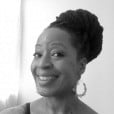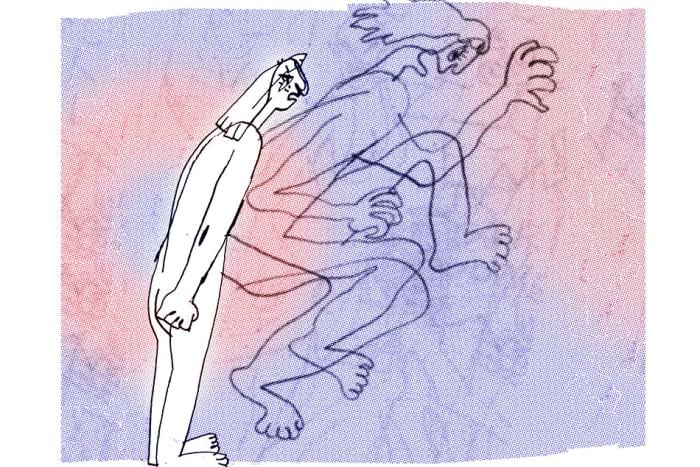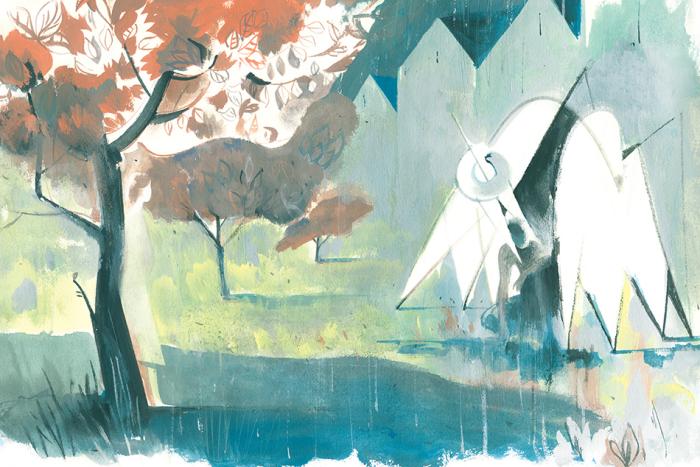“As a kid, I was obsessed with the character Maleficent in Sleeping Beauty, and I’ve always been attracted to the villain: the dark and demonic, or the ‘demonic feminine’ character,” says Kristen J. Sollee. “Darkness that doesn’t have to be construed as evil, or what patriarchy views as evil. I always wondered, ‘why are these women perceived as so scary?’ so I think all these interests are aligned in some way.” In her book, Witches, Sluts, Feminists: Conjuring the Sex Positive (Stone Bridge Press), Sollee examines how women who practice witchcraft have created a culture that empowers, not ridicules, mysticism. She defines witchcraft as an accumulation of a variety of occult practices practiced by a ‘witch:’ an identity that was once was thrust upon women to demean, shame and persecute, but has been transformed into a cultural symbol that promotes sex-positivity and feminine power.
After poring over dense historical documents on the history of witches and various practices, Sollee wrote a book that is a hybrid of sorts. She wields her journalism background in her careful application of feminist academic scholarship for important theorization on race, gender and queer studies. It also contains a concise account of the complicated history of witches from the medieval to the modern age, including Q&As with current practitioners. “I feel like a curator in many ways,” she says of the book’s unconventional structure. “I wanted other voices to speak loudly, and I don’t think you can do that when you simply incorporate quotes into a narrative.” By referencing recent political events, such as the 2016 U.S. election, Sollee traces the experiences of contemporary pop culture notables like LA Slutwalk organizer and model Amber Rose to demonstrate the lineage of witchcraft to contemporary feminism and sexuality.
In 2011, Sollée co-edited the anthology Can I Play With Madness: Metal, dissonance, madness and alienation, and has published several academic articles on heavy metal, sexuality and gender play. When she isn’t running Slutist, the online portal for sex-positive, popular culture and feminist criticism she founded in 2013, she teaches in the Gender Studies department at The New School in New York City and curates the annual festival The Legacy of the Witch, featuring sex-positive musical and performance artists and occult practitioners. “I must add that this book is about a community that is bigger than me,” she tells me over lunch at a Brooklyn diner. “I really wanted to take a step back and be as objective as possible and keep my personal asides to a minimum.” While she notes that she is telling a story that has gone on for several thousands of years, “I’d like to think that I offer different ways in approaching these issues.”
Laina Dawes: In addition to your childhood fascination, and your work as a feminist, what made you buckle down and write a book on witches?
Kristen J. Sollee: Well, I’ve always worked in the realm of gender, art and culture, whether it be visual art, music or fashion or film as a freelance journalist, but I’ve always been fascinated by the occult and my mother is a witch. She doesn't use that word, but she is intuitive, and I’ve experienced a lot of mystical occurrences because of her. My dad’s a staunch atheist, so their marriage didn’t last very long! There are a lot of people in my family on my mother’s side who are Catholic and they have their own secret practice, but they would never use that word because it is very sensitive/pejorative to them. So growing up, I had that interest and an interest in the aesthetic surrounding it.
I showed your book to one of my students, a young black woman. One of the first things she asked me when she saw the cover was about your definition of feminism. Just to elaborate on how you were careful about how you inserted your opinion within the book, I thought It was important that you made it clear that feminism was defined in Witches, Sluts, Feminists as intersectional.
That was central and of the utmost importance to me. Obviously, I was limited to my personal experience—I am a white woman—but there were so many witches, feminists and theorists of color that were extremely important to me and my continued growth as a feminist, so how could they not be part of the story? Within the history of witches and witchcraft, you cannot separate them. There was even a hashtag created: #Solidarityisforwhitewitches. I think that a lot of the aesthetic out there that focuses on what witches looked like in relation to Salem—even though we don’t really know, there is this notion that witches had dark hair, pale skin and blue eyes, even on Instagram if you look at the images within the common witch-centric accounts. But that is not the history.
Look at Beyoncé’s pregnancy photos and her music videos, and then there is Azealia Banks, who has publicly stated she is a practicing witch. Currently there are no white women doing that. On the feminist side and the witch side, it is very necessary right now to acknowledge women of color, as they are the leading activists in both realms. To write this book and not have it be as intersectional as I could make it would be illogical. I must say though that the book is not marketed as being an intersectional feminist book and race is not included on the back cover, because that is not for me to define. I think that doing so would be problematic—to position yourself as the arbiter of intersectionality.
The first time I heard the term "occulture" was in your book. What is your definition and how does it differ to what we consider as identity politics?
Well, occulture describes the how the occult is perceived within popular culture and the culture that has developed around that, in relation to witchcraft and intuition that can be considered in both theistic and nontheistic ways. This was also something I wanted to ensure was in this book, as there are a lot of people who don’t believe anything beyond science that are witches, and then there are the more spiritual witches that skeptical people would call “woo hoo” witches. I wanted the book to be open to all thoughts about the occult. There are many sects within occulture, different belief systems and ways of thinking about witchcraft: there are Wiccans, voodoo practitioners, fairies, satanists, the O.T.O (Ordo Templi Orientis, an international fraternal and religious organization influenced by the Early Witchcraft Movement) and ceremonial magicians. I do think it does function similarly to identity politics, in the sense that there are all kinds of fractures and infighting, so what I was trying to do was not to focus on one singular practice, but instead the community that can hopefully envelop all of them under this goal to demystify and to destigmatize the witch as how it is related to women.
This book is a continuation of your work as a lecturer of fourth-wave feminism.
Yes.
My understanding is that fourth-wave feminism is defined, in part, as feminism in the age of technology. As queer and trans women and women of colour often experience marginalization within “real-life” communities and are more likely to join online occultures and other niche communities, would occultures fall under the fourth-wave feminist umbrella?
Absolutely. Despite me teaching a class on on fourth-wave feminism, it’s still a debate as to what it is. It’s so nebulous, but really it acknowledges the Internet as a driving mechanism and force in feminist analysis and thought. It’s messy, but there has to be a shift as feminist discourse, and as it stands now, is different than it was in the 1990s, which is referred to as third-wave feminism. In 2008 Jessica Valenti wrote that the next wave of feminism is online, and I think she was one of the first people to acknowledge this shift. Within the book, I discuss digital activism and digital mystics that use the collective consciousness to promote their social justice activism.
That’s why it's interesting that the young women of colour I know who identify as witches are totally reliant on online communities and finding information online in order to find a community. Technology definitely helps in people finding out about the history and historical practices of witchcraft. And yes, a lot of this is totally self-directed (through online interactions). I feel like the witches that are the most influential online are queer women of color. Right now the website The Hood Witch is, in my opinion, the biggest witch “portal” which really crosses race and gender lines. It speaks to the age bracket of 18-40 and maybe older, but it hits that Instagram, millennial generation.
Your discussions surrounding how the term “slut” signifies empowerment were illuminating, but I still felt some hesitance in introducing it as a descriptor in defining myself in a sex-positive way. You do mention how racialized sexism and sexualized racism do alter how “slut” is perceived, particularly among women of colour.
The reason I added it was because of the years of conversations I’d had with organizers of the various Slutwalks around the country. Women of colour in particular often acknowledged the difference between me and them being called a slut—similar to the difference when someone calls a transwoman versus a cis woman a slut. For identities that are more marginalized and more likely to be victims of violence, it is much harder to claim a word that in some ways seems like it gives permission for this violence to be acted upon you. That was another point in which I tried to look at all the angles, because for some people, using the word is simply untenable. You simply cannot use the word in a positive way. Maybe in your mind—but in reality, it is off the table.
But I felt that it was important to put it on the table. Sexual violence is so prevalent that it’s almost irresponsible not to note how this word is still so oppressive to certain groups more than other groups. So, let’s not be naive about it. There is so much more ability for white women to work within that realm (in the empowering usage of that word) than for others. And that has been one of the criticisms of Slutwalk. I have all of my students go online and read all the critiques of it, because I want to ensure that they see all of the angles to this activism, but there is still great power to be had when we take these words to empower ourselves.
However, there are plenty of women of color who freely use slut to define themselves—they are sex workers, burlesque dancers and other artists who are proud to be defined as that, so again, it’s also not fair to essentialize the usage as being negative for all women. And there are white women who are also opposed to reclaiming it.
You mention the book The Malleus Maleficarum, written in 1486, and describe it as “ye olde medieval BDSM erotica” because of the depictions of the sexual interactions between witches and incubus devils. You write that since that book was published, stereotypes about the deviant sexuality of women who do not fit into conventional societal categories still exist. Erotica for the sexual stimulation of the readers is commonplace, so is the stigma around such materials. Do you ever see that changing within your lifetime?
Well I hope within my lifetime—maybe in sixty years if I’m still alive! Obviously right now we are living in a really interesting moment, where there is an admitted sexual assailant in the White House, and I don’t know how far back that has put American society. On the other hand, there is pushback against that, and conversations about sexual assault are more commonplace than when I was growing up. That is what is great about being a young woman today, as they are participating in all of these great discussions to really understand what behaviour is not okay, which is a lot better than I could say when I was their age.
And they are given more of an allowance to say “yes” or “no.” To give their opinion.
Yes! I didn’t even know that saying “no” was okay when I was a kid. There are more open conversations about consent.
In popular music culture, including rock n’ roll and heavy metal, it's always been questionable as to whether the occult is used as a marketing tool in offering provocative imagery or whether the artists are channeling their spiritual beliefs through their music.
A lot of that discussion is centered on the male occultists, like Aleister Crowley, all of these male figures, but really the female or the gender non-conforming or anyone who doesn’t fall under the gender binary are more powerful. Women and queer folks are using real rituals and their actual practices are being infused into their art, which is different than what bands, such as Motley Crue were offering in their early years. However, some metal bands, like Watain, are real Satanists, and actually do rituals onstage. From what I know and from friends I know who tour with them, they are serious. But you would never really know, because there are so many bands in which it is used as shock value.
In terms of the visual imagery and whether it’s authentic, you could say the same thing about Beyoncé’s [use of Yoruban deity imagery for her pregnancy photoshoot] outfits.
Definitely. What was interesting to me was the response from black folks who had challenged her “wokeness.” It seemed like those Instagram pictures legitimized her blackness.
Well, some people did call her out, like Azealia Banks, who accused her of using the aesthetic of her religious practice to make money, and I saw some other people of colour who are witches who also questioned her look, as Beyoncé is super-Christian. But it could possibly be that she is getting rid of that and turning to a spiritual practice that better suits her, so who knows? I feel that there is still a lot of doubt within the music scene—outside of heavy metal —which is, “is this for real?” But because of the number of Internet communities that are discussing the occult I hope these questions will be answered.






